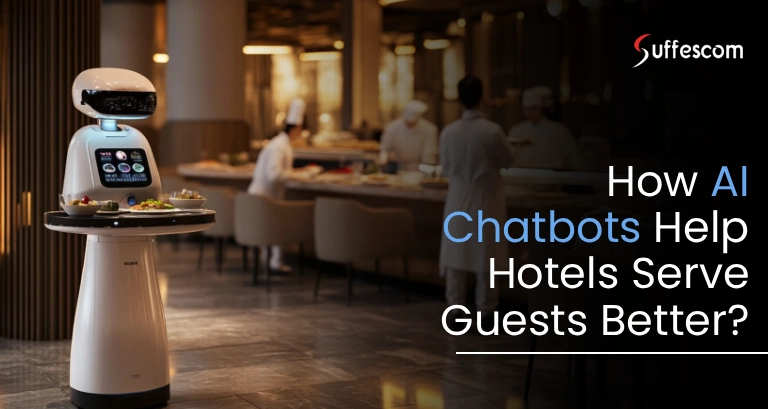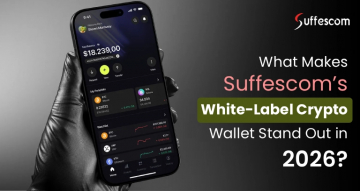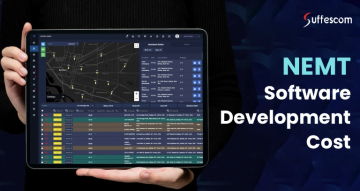AI Chatbots for Hospitality: How Revolutionizing Hotel Operations?

The hospitality business operates on the principle of outstanding guest service. In the digital environment, tourists expect immediate communication, personalized suggestions, and seamless service at every point. Filling these anticipations while ensuring operational efficiency is increasingly becoming difficult for hotels. This is where AI chatbots for serving hotel guest requirements shine.
AI-based chatbots are transforming the hospitality industry by enabling hotels to provide round-the-clock assistance. It manages multiple guest requests simultaneously, and designs highly personalized guest experiences. Apart from convenience, these virtual assistants allow hotels to save on operational expenses, drive bookings, and enhance customer loyalty.
According to Hotel Tech Report, AI in hospitality market is growing from USD 90 million in 2022 to USD 8.12 billion by 2033, representing a CAGR of 60%
This blog offers a detailed explanation of how AI chatbots enhance hotel guest interactions and why they have become a vital tool for innovative hospitality companies.
What is an AI Hospitality Management Chatbot?
An AI hotel chatbot is a conversational software that utilizes artificial intelligence and natural language processing. Unlike older bots, it uses pre-programmed scripts. AI chatbots analyze guest questions in natural language, sense intent, and offer context-driven, relevant responses.
For hotels, these chatbots are an online attendant, serving guests instantly when they click into a booking page, and after they've checked out. Chatbots streamline guest interactions and make them more convenient through websites, mobile apps, or messaging interfaces like WhatsApp and Facebook Messenger.
An AI hotel chatbot is a conversational software that utilizes artificial intelligence and natural language processing. Unlike older bots, it uses pre-programmed scripts. AI chatbots analyze guest questions in natural language, sense intent, and offer context-driven, relevant responses.
For hotels, these chatbots are an online attendant, serving guests instantly when they click into a booking page, and after they've checked out. Chatbots streamline guest interactions and make them more convenient through websites, mobile apps, or messaging interfaces like WhatsApp and Facebook Messenger.
Why AI Chatbots For Hotels Is Essential For Time Now?
Hospitality is a high-touch business where being on time is crucial in creating a seamless guest experience. Today's traveller expects:
24/7 support:
Visitors come from various time zones and require service at any time.
Mobile-first convenience:
Bookings and services are increasingly being requested through smartphones.
Personalization:
Travellers prefer customized suggestions over generic ones.
Fast problem-resolution:
Any delay in responding to a question can impact guest satisfaction scores.
How AI Hotel Chatbot Helps Guests?
The application of AI chatbots in the hospitality industry extends beyond FAQs. The following is a comprehensive explanation of how AI chatbot assists hotel guest interactions at various points in their process.
1. Booking and Reservations Support
Guests are able to inquire about availability, compare prices, and even book rooms directly through the chatbot without having to call the reception. The friction is reduced, and direct bookings are enhanced for hotels.
2. 24/7 Customer Support
Chatbots offer support in multiple languages, 24/7, including midnight and early morning hours. It is making foreign travellers feel never lost.
3. Instant FAQs and Policy Information
Chatbots deliver reliable answers instantly, from check-in times to cancellation. It reduces the desk workload.
4. Personalized Recommendations
Bots can recommend restaurants, spa treatments, or nearby attractions according to the interest of guests. It helps to make their stay more enjoyable and personalized.
5. Service Requests and Complaints
Guests can order room service, report concerns, or request housekeeping via the chatbot, promoting quicker resolution and fewer escalations.
6. Cross-Platform Communication
Chatbots can easily integrate across websites, hotel apps, and even top platforms such as WhatsApp, Messenger, or SMS. It is because the chatbot can be used where customers already spend their time, ensuring instant communication, seamless support, and a consistent experience across multiple channels.
How to Integrate AI Chatbot In Your Hospitality Business?
Implementing a hotel chatbot requires planning, alignment with business objectives, and careful rollout. Here's a seven-step process for hotels to follow:
1. Define the Objectives
Begin by defining what you need the chatbot to do. Do you want top priority on quicker booking assistance? Or do you need 24/7 multilingual support? A few hotels employ chatbots primarily for upselling purposes. When goals are well-defined initially, it is simpler to create a solution that fits both guest expectations and operational needs.
2. Select the Appropriate Platform
Then, choose where the chatbot will reside. For some sites, the hotel website is sufficient. Others will benefit by including it in their mobile app or messaging platforms such as WhatsApp and Facebook Messenger. In most instances, an omnichannel strategy is ideal because clients prefer to use the channels they are already familiar with.
3. Choose a Technology Partner
Building and launching a chatbot is relatively easy for most hotels. It involves specialized knowledge in AI, natural language understanding, and hospitality systems. This is the reason why many hotels collaborate with a seasoned AI chatbot development company. A good partner ensures that the chatbot is not only operational but also scalable and secure.
4. Integrate with Existing Hotel Systems
To provide real-time support, it must integrate with the hotel property management system (PMS), and booking engine. The chatbot can validate bookings, sync guest profiles, and present availability without human intervention when it is correctly integrated.
5. Train the Chatbot for Hospitality Needs
Generic chatbots aren't equipped to manage the specific needs of hospitality. That is why training becomes paramount. The bot must be trained on information regarding room categories, facilities, check-in policies, service orders, and popular guest questions. The more precise and hotel-based the training, the more effectively the chatbot will translate in actual guest conversations.
6. Make Sure to Offer Multilingual Support
Hotels cater to visitors from other countries and cultures. Language assistance is therefore vital. A multi-lingual chatbot eliminates language barriers and makes international visitors more comfortable.
7. Automation and Human Support
The most advanced AI has its own limitations. Thus, designing a seamless handover to staff where necessary is essential. For example, if a guest makes a sensitive complaint, the chatbot must escalate to a human colleague. This equilibrium maintains high efficiency without compromising service.
8. Test and Optimize Continuously
Lastly, implementation is not a one-time work. A chatbot requires constant testing, feedback, and optimization. Hotels must track how guests use it, review conversation information, and continually update it. Through time, these updates increase the bot's knowledge base and refine its accuracy.
What Are The Real-Life Use Cases of AI Chatbots For Hotels and Resorts?
AI Chatbots for Hotels have become necessary for enhanced guest interaction and operational effectiveness. Several top hotels are already seeing tangible ROI from their implementations. Some practical instances of these solutions are given below.
1. Front Desk Automation
Chatbots are now the first interaction point for guests; they don't have to wait in long queues while checking in. Automating arrivals and departures cuts front desk queues and enhances guest interaction. It also allows employees to work on high-value interactions rather than routine administrative work.
2. Virtual Concierge Services
A 24/7 high-quality availability is a game-changer in the hospitality industry. Customers may request sightseeing tips from chatbots, make dining reservations, or receive instant transportation information. Unlike a limited-hour concierge service, AI provides round-the-clock assistance without extra staff expense.
3. In-Room Support with IoT Integration
If coupled with smart devices, an AI-based hotel voice bot enables guests to operate lights, adjust the room temperature, or order services by simply giving voice or text commands. This provides convenience while also enhancing the high-end experience that contemporary travellers anticipate.
4. Event and Group Booking Support
Large groups such as weddings, conferences, or company retreats create a number of repetitive questions. AI guest messaging enables hotels to process group booking requests easily, distribute schedules, and respond to common queries. This ensures seamless coordination and prevents service lags during peak times.
AI Hotel Chatbots Development Supporting 10 Technologies
1. Artificial Intelligence & Machine Learning
Natural Language Processing (NLP): For understanding guest queries in multiple languages.
Machine Learning Algorithms: Improve chatbot responses based on past interactions.
Sentiment Analysis: Detect guest mood and adapt tone accordingly.
2. Conversational Platforms
Dialogflow, Rasa, Microsoft Bot Framework, IBM Watson Assistant – provide NLP, conversation flow, and integrations.
Generative AI Models (like GPT-based systems): Enable human-like responses, upselling, and personalized recommendations.
3. Hotel Management System Integrations
Property Management System (PMS): Syncs reservations, check-in/out, and guest profiles.
Central Reservation System (CRS): Real-time room availability and booking updates.
Channel Managers & OTAs: Keep pricing and availability consistent across platforms (Booking.com, Expedia, etc.).
4. APIs & Middleware
REST & GraphQL APIs: Connect chatbot with hotel systems (POS, PMS, CRM).
Payment Gateways (Stripe, PayPal, Razorpay): Enable direct bookings and payments through chat.
IoT & Smart Devices Integration: For in-room control (lights, AC, TV).
5. Voice Technology
Speech Recognition APIs (Google Speech-to-Text, Amazon Transcribe): Voice-enabled concierge services.
Text-to-Speech (Amazon Polly, Azure TTS): Natural voice responses for multilingual guests.
Alexa for Hospitality, Google Assistant: Hands-free guest interactions.
6. Cloud & Hosting Infrastructure
AWS, Microsoft Azure, Google Cloud: Scalable chatbot hosting.
Serverless Functions (AWS Lambda, Cloud Functions): Handle real-time conversational requests.
CDN & Edge Networks: Ensure global responsiveness for international hotels.
7. Security & Compliance
GDPR & CCPA Compliance: Protect guest data privacy.
Data Encryption (SSL/TLS): Secure communication.
Role-based Access Control: Prevent unauthorized staff access to guest info.
8. Data & Analytics
Customer Data Platform (CDP): Centralize guest preferences for personalization.
Predictive Analytics: Forecast demand and suggest upsells (spa, dining, late checkout).
BI Tools (Power BI, Tableau): Track chatbot performance and ROI.
9. Multilingual & Translation Engines
AI Translation APIs (DeepL, Google Translate API): Support global travelers.
Custom Multilingual NLP Models: Understand local phrases and dialects.
10. Omnichannel Support
Messaging Platforms (WhatsApp Business, Facebook Messenger, WeChat, Viber): Engage guests where they prefer.
Hotel Websites & Mobile Apps: Embedded AI chat widget.
SMS & Email Integrations: For confirmations and follow-ups.
Are AI Chatbots in Hospitality Profitable in the Future?
AI chatbots in hospitality hold strong profit potential for the future. They reduce staffing costs, improve customer service, and offer 24/7 support. From bookings to personalized recommendations, chatbots enhance guest experience while driving efficiency. As hotels adopt digital solutions, profitability increases through automation, upselling opportunities, and improved customer satisfaction.
The scope of AI Chatbots for hotels is expanding. These technologies will transform into guest interactions that increase personalization, optimize operations, and establish long-term loyalty. The future trends driving the industry are outlined below.
1. Predictive Service Delivery
Next-generation chatbots foretell the real user requirements before they occur. For instance, when a visitor makes a reservation for a week, the system may automatically recommend spa offers or check-out opportunities. This forward-thinking enhances guest satisfaction and opens up new opportunities for revenue to hotels.
2. Voice-Activated Chatbots in Rooms
As smart devices become increasingly popular, the AI-driven hotel voice bot will be the new norm. Guests can already control room temperature, order room service, or ask for housekeeping by simply speaking. This voice-control comfort replaces reliance on front desk personnel.
3. Hyper-Personalized Guest Engagement
Future AI-powered guest messaging platforms are far superior to generic responses. Through analysis of past stays, dining preferences, chatbots will create customized offers like organized restaurant suggestions or room upgrades. This level of hyper-personalization significantly contributes to increased guest engagement and stronger relationships.
4. AI-Driven Loyalty Programs
Loyalty programs will become dynamic, AI-based models replacing static points systems. Chatbots can provide real-time personalized rewards, for instance, offering bonuses to business travellers, and providing families with discounts on family-friendly activities. Such personalized offerings enhance retention and drive repeat bookings.
5. Smart Travel Ecosystem Integration
Hotel chatbots are also integrated with airlines, ride-sharing services, and local tourist attractions. It offers a unified travel experience. An arriving guest can easily receive a chatbot invitation for an immediate cab to the hotel, confirm check-in, and make dinner reservations nearby, all through a single digital touchpoint.
Process of AI Chatbot Development for Hotels, Resorts, and Restaurant Chains?
Let’s start with a scenario: if a mid-scale hotel chain or entrepreneur business owner wants to integrate an AI hospitality chatbot into their operations, the journey involves multiple steps. The goal is to enhance guest experiences, streamline operations, and create new revenue opportunities. Below is a clear outline of the AI chatbot development process that most AI development companies follow:
1. Requirement Analysis & Business Understanding
Identify business goals: reservation automation, upselling, guest support, or multilingual services.
Map customer journeys (booking, dining, check-in/out, special requests).
Define KPIs for chatbot success (reduced response time, improved conversion rate).
2. Choosing the Right Chatbot Type
Rule-based bots for FAQs and standard queries.
AI-driven bots with NLP and ML for personalized recommendations, voice support, and upselling.
Hybrid approach for scalability in hotel and restaurant chains.
3. Conversation Design & User Experience
Create dialog flows based on guest interactions (room booking, menu inquiries, spa reservations).
Design multilingual and voice-enabled conversations for global travelers.
Ensure smooth escalation to human agents when needed.
4. Technology Stack & Platform Selection
NLP Engines: Dialogflow, Rasa, IBM Watson, GPT-based solutions.
Messaging Channels: Website widget, mobile app, WhatsApp, Messenger, or in-room smart devices.
Integrations: Property Management System (PMS), Central Reservation System (CRS), POS, and CRM.
5. AI Model Training & Development
Train chatbot with historical booking data, FAQs, and restaurant menus.
Incorporate machine learning for upselling (e.g., room upgrades, meal add-ons).
Add sentiment analysis to adjust tone based on guest mood.
6. System Integration
Seamless connection with restaurant software, hotel PMS, and payment gateways.
Integration with loyalty programs, marketing automation, and guest review systems.
Ensure chatbot works across multiple outlets in restaurant chains and hotel chains.
7. Testing & Quality Assurance
Test across channels (mobile, web, WhatsApp, kiosks).
Run load tests for peak booking times.
Validate language accuracy, personalization, and upselling triggers.
8. Deployment & Staff Training
Deploy chatbot in phases (pilot at one outlet → expand to chain).
Provide staff training to handle escalations and monitor chatbot performance.
Enable feedback collection for continuous improvement.
9. Maintenance, Analytics & Scaling
Monitor chatbot performance with analytics dashboards.
Continuously update AI models with new data.
Scale features to include concierge services, in-room IoT integration, and smart upselling.
Factors That Influence AI Chatbot Development and Integration Costs
Building an AI chatbot for hotels, resorts, and restaurant chains is a strategic investment that can improve customer experience, automate operations, and increase revenue. However, the overall AI cost depends on several development and integration factors that businesses should consider carefully.
- Chatbot Complexity and Features
- Integration with Existing Systems
- Scalability and Omnichannel Support
- Maintenance, Analytics, and Continuous Improvement
End Note!
The hospitality industry is all about comforting the guests and creating lasting experiences. Today, in the competitive atmosphere, meeting these expectations requires more than simple classical service models. The way AI chatbots enable hotel guest interactions is discovered by their capacity to provide instant assistance, personalized suggestions, and simplified communication across multiple platforms.
For hotels, AI chatbots are a necessity. It helps to reduce operational expenses and enhances guest satisfaction. As technology continues to evolve, chatbots will play an increasingly significant role in shaping the future of guest interactions.
FAQs
How can AI chatbots improve guest experience in hotels?
AI chatbots provide instant responses, personalized recommendations, and 24/7 support for bookings. It reduces waiting times and boosts guest satisfaction over time.
Can chatbots integrate with hotel management systems (PMS/CRM)?
Integration is one of the biggest strengths of today’s solutions. They can integrate with property management systems and booking engines, ensuring that reservations, guest profiles, and loyalty programs are all updated in real-time.
Are AI chatbots cost-effective for small and mid-sized hotels?
Large chains use advanced systems, white-label or custom AI chatbot solutions are available for smaller hotels to improve efficiency without high upfront investment.
How do chatbots ensure data security for guests?
With more digital touchpoints, security is non-negotiable. Most of the platforms comply with global standards such as GDPR and PCI-DSS. They use encrypted communication to safeguard transactions that give peace of mind to hotels and their guests.







